|
This
article is a part of a continuing series on the ‘Mahavansa’,the
recorded chronicle of Sri Lankan history
Prince Gamini flees
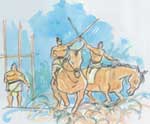 1.
By 180 BC, the city of Magama was more populated than Anuradhapura.
There were houses built on all the streets and the majority of the
houses were occupied by the warriors. There were also centres put
up for the training of the army. The incr4ease in population posed
a food problems. Hence, King Kavan-Tissa’s idea of sending
Tissa to Digamadulla, to be the ruler there and improve agriculture.
However, the king was determined not to send Prince Gemunu out of
Magama. He was allowed to associate with the ten great warriors
ands engage himself in military training. 1.
By 180 BC, the city of Magama was more populated than Anuradhapura.
There were houses built on all the streets and the majority of the
houses were occupied by the warriors. There were also centres put
up for the training of the army. The incr4ease in population posed
a food problems. Hence, King Kavan-Tissa’s idea of sending
Tissa to Digamadulla, to be the ruler there and improve agriculture.
However, the king was determined not to send Prince Gemunu out of
Magama. He was allowed to associate with the ten great warriors
ands engage himself in military training.
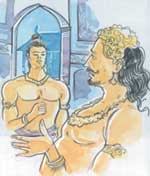 2.
Before long, Prince Gamini realized that armies at Magama were of
a high standard and it was the ideal time to fight the enemy. He
went to his Father and asked for permission to wage war against
Elara’s army. The king said “No” and added, “It
is more than enough for us to rule the land, this side of Mahaweli”.
King Kavan-Tiss knew exactly how powerful Elara was, with 20 great
warriors in his army. 2.
Before long, Prince Gamini realized that armies at Magama were of
a high standard and it was the ideal time to fight the enemy. He
went to his Father and asked for permission to wage war against
Elara’s army. The king said “No” and added, “It
is more than enough for us to rule the land, this side of Mahaweli”.
King Kavan-Tiss knew exactly how powerful Elara was, with 20 great
warriors in his army.
3. Prince
Gemunu was depressed. After a while, he begged permission again
and that time too, the king refused, saying it is pointless to kill
innocent people, in the fighting. The prince suppressed his anger
and went away, in silence. The queen mother , then approached him
and consoled him saying, “Son, do not be upset. Your father
is not permitting you to go to war simply because he loves you so
much. He loves the two sons more than his life. So do not get angry”.
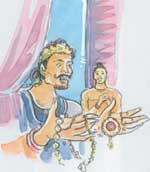 4.
Time passed. The prince thought of approaching his father once more.
When the father asked him what worried him, he said, “How
long are we going to wait like this? Now is the most opportune moment
to declare war”. The king’s reply was again in the negative.
He said, “Did I not tell you twice before, how useless it
is to go to war? Let us mind our affairs and rule this part of the
country”. The prince was deeply hurt but went away, silently
controlling his anger. 4.
Time passed. The prince thought of approaching his father once more.
When the father asked him what worried him, he said, “How
long are we going to wait like this? Now is the most opportune moment
to declare war”. The king’s reply was again in the negative.
He said, “Did I not tell you twice before, how useless it
is to go to war? Let us mind our affairs and rule this part of the
country”. The prince was deeply hurt but went away, silently
controlling his anger.
5.
The prince summoned a messenger, gave him a parcel and said, “If
my father were a man, he would not speak like this. He is a woman.
Give these female ornaments to him”. The messenger did as
he was told. The king was very angry on receiving them. He ordered
his men to chain the prince, using a golden chain.
The prince got alarmed and he fled the city.
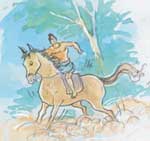 6.
Prince Gemunu, who wandered in disguise stopped in Kotmale in the
‘Malaya Rata’. There he went to a house in Urupelessa,
and begged for some sort of work, to support himself. The people
of the household took a liking to him at once but did not know who
he was. So they kept him in charge of their cattle. The prince did
this job very well. 6.
Prince Gemunu, who wandered in disguise stopped in Kotmale in the
‘Malaya Rata’. There he went to a house in Urupelessa,
and begged for some sort of work, to support himself. The people
of the household took a liking to him at once but did not know who
he was. So they kept him in charge of their cattle. The prince did
this job very well.
7.
The villager who lived in this house had two daughters. One was
named Kalu-Menike and the other, Ran-Menike. Noticing the smartness
of the youth, the villager decided to give one of his daughters
in marriage to him, not knowing that he belonged to royalty. One
of the daughters, Ran-Menike, liked him and helped him in his work
and he in turn liked him.
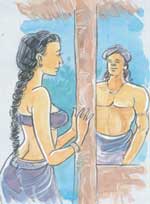 8.
Meanwhile the prince started to cultivate a block of land. He went
to the village ironsmith to get a mammoty made. The ironsmith took
no notice of him. When he got to know he was from the villager’s
house, he said he was busy and asked the prince to come sometime
later. The ironsmith went in for lunch. The prince collected a few
pieces of metal that was lying there, heated them and made a big
mammoty. On seeing this, the ironsmith’s wife was frightened,
thinking the youth had miraculous powers. The ironsmith brushed
her aside saying, “What does it matter to me? Is he going
to be king one day and kill me at the stakes?” The legend
adds that that when the prince became king, he saw to it that the
ironsmith was killed at the stakes and that spot was named Ulapane.
However, neither the Mahavamsa nor the Thupavamsa mentions this
episode. It is purely a legend. 8.
Meanwhile the prince started to cultivate a block of land. He went
to the village ironsmith to get a mammoty made. The ironsmith took
no notice of him. When he got to know he was from the villager’s
house, he said he was busy and asked the prince to come sometime
later. The ironsmith went in for lunch. The prince collected a few
pieces of metal that was lying there, heated them and made a big
mammoty. On seeing this, the ironsmith’s wife was frightened,
thinking the youth had miraculous powers. The ironsmith brushed
her aside saying, “What does it matter to me? Is he going
to be king one day and kill me at the stakes?” The legend
adds that that when the prince became king, he saw to it that the
ironsmith was killed at the stakes and that spot was named Ulapane.
However, neither the Mahavamsa nor the Thupavamsa mentions this
episode. It is purely a legend.
By
Halaliye Karunathilaka
Edited and translated by Kamala Silva
Illustrated by Saman Kalubowila |
 1.
By 180 BC, the city of Magama was more populated than Anuradhapura.
There were houses built on all the streets and the majority of the
houses were occupied by the warriors. There were also centres put
up for the training of the army. The incr4ease in population posed
a food problems. Hence, King Kavan-Tissa’s idea of sending
Tissa to Digamadulla, to be the ruler there and improve agriculture.
However, the king was determined not to send Prince Gemunu out of
Magama. He was allowed to associate with the ten great warriors
ands engage himself in military training.
1.
By 180 BC, the city of Magama was more populated than Anuradhapura.
There were houses built on all the streets and the majority of the
houses were occupied by the warriors. There were also centres put
up for the training of the army. The incr4ease in population posed
a food problems. Hence, King Kavan-Tissa’s idea of sending
Tissa to Digamadulla, to be the ruler there and improve agriculture.
However, the king was determined not to send Prince Gemunu out of
Magama. He was allowed to associate with the ten great warriors
ands engage himself in military training. 2.
Before long, Prince Gamini realized that armies at Magama were of
a high standard and it was the ideal time to fight the enemy. He
went to his Father and asked for permission to wage war against
Elara’s army. The king said “No” and added, “It
is more than enough for us to rule the land, this side of Mahaweli”.
King Kavan-Tiss knew exactly how powerful Elara was, with 20 great
warriors in his army.
2.
Before long, Prince Gamini realized that armies at Magama were of
a high standard and it was the ideal time to fight the enemy. He
went to his Father and asked for permission to wage war against
Elara’s army. The king said “No” and added, “It
is more than enough for us to rule the land, this side of Mahaweli”.
King Kavan-Tiss knew exactly how powerful Elara was, with 20 great
warriors in his army. 4.
Time passed. The prince thought of approaching his father once more.
When the father asked him what worried him, he said, “How
long are we going to wait like this? Now is the most opportune moment
to declare war”. The king’s reply was again in the negative.
He said, “Did I not tell you twice before, how useless it
is to go to war? Let us mind our affairs and rule this part of the
country”. The prince was deeply hurt but went away, silently
controlling his anger.
4.
Time passed. The prince thought of approaching his father once more.
When the father asked him what worried him, he said, “How
long are we going to wait like this? Now is the most opportune moment
to declare war”. The king’s reply was again in the negative.
He said, “Did I not tell you twice before, how useless it
is to go to war? Let us mind our affairs and rule this part of the
country”. The prince was deeply hurt but went away, silently
controlling his anger. 6.
Prince Gemunu, who wandered in disguise stopped in Kotmale in the
‘Malaya Rata’. There he went to a house in Urupelessa,
and begged for some sort of work, to support himself. The people
of the household took a liking to him at once but did not know who
he was. So they kept him in charge of their cattle. The prince did
this job very well.
6.
Prince Gemunu, who wandered in disguise stopped in Kotmale in the
‘Malaya Rata’. There he went to a house in Urupelessa,
and begged for some sort of work, to support himself. The people
of the household took a liking to him at once but did not know who
he was. So they kept him in charge of their cattle. The prince did
this job very well. 8.
Meanwhile the prince started to cultivate a block of land. He went
to the village ironsmith to get a mammoty made. The ironsmith took
no notice of him. When he got to know he was from the villager’s
house, he said he was busy and asked the prince to come sometime
later. The ironsmith went in for lunch. The prince collected a few
pieces of metal that was lying there, heated them and made a big
mammoty. On seeing this, the ironsmith’s wife was frightened,
thinking the youth had miraculous powers. The ironsmith brushed
her aside saying, “What does it matter to me? Is he going
to be king one day and kill me at the stakes?” The legend
adds that that when the prince became king, he saw to it that the
ironsmith was killed at the stakes and that spot was named Ulapane.
However, neither the Mahavamsa nor the Thupavamsa mentions this
episode. It is purely a legend.
8.
Meanwhile the prince started to cultivate a block of land. He went
to the village ironsmith to get a mammoty made. The ironsmith took
no notice of him. When he got to know he was from the villager’s
house, he said he was busy and asked the prince to come sometime
later. The ironsmith went in for lunch. The prince collected a few
pieces of metal that was lying there, heated them and made a big
mammoty. On seeing this, the ironsmith’s wife was frightened,
thinking the youth had miraculous powers. The ironsmith brushed
her aside saying, “What does it matter to me? Is he going
to be king one day and kill me at the stakes?” The legend
adds that that when the prince became king, he saw to it that the
ironsmith was killed at the stakes and that spot was named Ulapane.
However, neither the Mahavamsa nor the Thupavamsa mentions this
episode. It is purely a legend.